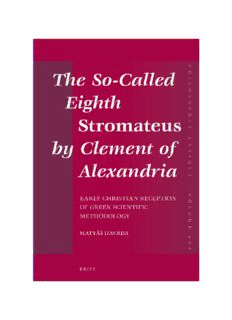Table Of ContentTheSo-CalledEighthStromateusbyClementofAlexandria
Philosophia Antiqua
a series of studies on ancient philosophy
EditorialBoard
C.J.Rowe(Durham)
K.A.Algra(Utrecht)
F.A.J.deHaas(Leiden)
J.Mansfeld(Utrecht)
D.T.Runia(Melbourne)
Ch.Wildberg(Princeton)
PreviousEditors
J.H.Waszink†
W.J.Verdenius†
J.C.M.VanWinden†
volume144
Thetitlespublishedinthisseriesarelistedatbrill.com/pha
The So-Called Eighth
Stromateus by Clement
of Alexandria
EarlyChristianReception
ofGreekScientificMethodology
By
MatyášHavrda
leiden | boston
LibraryofCongressCataloging-in-PublicationData
Names:Havrda,Matyáš,1972-|Clement,ofAlexandria,Saint,approximately
150-approximately215.Stromata.Liber8.|Clement,ofAlexandria,Saint,
approximately150-approximately215.Stromata.Liber8.English.
Title:Theso-calledeighthStromateusbyClementofAlexandria:early
ChristianreceptionofGreekscientificmethodology/byMatyášHavrda.
Description:Leiden;Boston:Brill,[2017]|Series:Philosophiaantiqua,
issn0079-1687;volume44|Includesbibliographicalreferencesandindex.
Identifiers:lccn2016030309(print)|lccn2016035973(ebook)|isbn
9789004310087(hardback:acid-freepaper)|isbn9789004325289(e-book)
Subjects:lcsh:Clement,ofAlexandria,Saint,approximately
150-approximately215.|Philosophy,Ancient.|Science–Philosophy–Early
worksto1800.|Science–Methodology–Earlyworksto1800.|Clement,of
Alexandria,Saint,approximately150-approximately215.Stromata.
Classification:lcc b666.s63 s63 2017(print)|lcc b666.s63(ebook)|ddc
189/.2–dc23
lcrecordavailableathttps://lccn.loc.gov/2016030309
WantorneedOpenAccess?BrillOpenoffersyouthechoicetomakeyourresearchfreelyaccessibleonline
inexchangeforapublicationcharge.Reviewyourvariousoptionsonbrill.com/brill-open.
TypefacefortheLatin,Greek,andCyrillicscripts:“Brill”.Seeanddownload:brill.com/brill-typeface.
issn0079-1687
isbn978-90-04-31008-7(hardback)
isbn978-90-04-32528-9(e-book)
Copyright2016byKoninklijkeBrillnv,Leiden,TheNetherlands.
KoninklijkeBrillnvincorporatestheimprintsBrill,BrillHes&DeGraaf,BrillNijhoff,BrillRodopiand
HoteiPublishing.
Allrightsreserved.Nopartofthispublicationmaybereproduced,translated,storedinaretrievalsystem,
ortransmittedinanyformorbyanymeans,electronic,mechanical,photocopying,recordingorotherwise,
withoutpriorwrittenpermissionfromthepublisher.
AuthorizationtophotocopyitemsforinternalorpersonaluseisgrantedbyKoninklijkeBrillnvprovided
thattheappropriatefeesarepaiddirectlytoTheCopyrightClearanceCenter,222RosewoodDrive,
Suite910,Danvers,ma01923,usa.Feesaresubjecttochange.
Thisbookisprintedonacid-freepaperandproducedinasustainablemanner.
Contents
Preface vii
Abbreviations xi
Introduction.TheRiddleofthe‘EighthStromateus’:Questionsand
Solutions 1
AncientandByzantineTestimonies 1
CompositionandContents 9
ModernInterpretations 11
a EarlyModernReaders:FromHeinsetoBunsen 11
b TheShapingofContemporaryViews:FromZahntoStählin 14
c OtherSolutions:Ernst,Bousset,Nautin 18
Liberlogicus 25
a IntellectualSetting(s) 25
b ThematicDivision 27
c Sources:ReviewofScholarship 29
d HowManySources? 32
e TheGalenHypothesis 34
f ContinuitywiththeStromateis? 50
g ParallelswiththeStromateis 56
h ChristianTraitsinStromateisviii 73
i Conclusions 76
TheSo-CalledEighthStromateus(‘Liberlogicus’)byClementof
Alexandria:GreekText,Translation,andCommentary
PrefatoryNotetotheGreekTextandTranslation 81
GreekTextandTranslation 86
Commentary 128
(i)1,1–2,5:‘SeekandYouWillFind’ 128
(ii)3,1–(iii)8,3:TeachingonDemonstration 145
(iii)8,4–(v)15,1:MethodofDiscovery 174
(v)15,2–163:SuspensionofJudgementi 199
(vi)17,1–21,6:DivisionandDefinition 218
(vii)22,1–4:SuspensionofJudgementii 241
vi contents
(viii)23,1–24,9:Categories 246
(ix)25,1–33,9:Causes 262
Bibliography 313
IndexofModernAuthors 338
IndexofSubjectsandNames 341
IndexofSources 353
Preface
Thisbookisastudyoftheso-calledeighthStromateusbyClementofAlexan-
dria(d.before221c.e.).Itscoreisalemmaticcommentary,accompaniedbythe
Greektext,translation,andanintroduction,whichdealswiththeperplexing
questionoftheoriginandpurposeofthismysterioustext.
The‘eighthbook’isnotastandardbookoftheStromateis.Toallappearances,
itisacollectionofexcerpts,which,forthemostpart,areofapurelyphilosoph-
icalnature.Forvariousreasons(mainly,Isuspect,becauseitfallsin-between
different fields of historical expertise), the text has been rather neglected by
scholars,boththoseworkinginancientphilosophyandtheexpertsonClem-
ent.Thelastmonographdedicatedtoit(oneofthelastGermandissertations
writteninLatin)waspublishedmorethanacenturyago,andthenumberof
scholars who have explored it in detail (apart from a few passages, immor-
talizedbytheirinclusioninvonArnim’scollectionofStoicfragments)would
easilyfitintoamedium-sizedseminarroom.
This obscurity contrasts with the fact that the text deals, in an informed
andintelligentmanner,withanumberoftopicsthatscholars,especiallythose
workingonancientphilosophy,usuallyfindinteresting:demonstration,dialec-
tic,divisionanddefinition,categories,causation,andscepticism.Acloserlook
shows that these topics are treated in a didactic and introductory style, but
notinawaythatcouldbedescribedasnaïveorconventional.Hereisatext
standinginthetraditionofAristotle’sOrganon,combiningfreelybutrigorously
Aristotelian elements with those coming from later sources (Stoic, Platonist,
sceptic,andmedical);chiefly,asitseems,inordertoprovidemethodological
instruction.
Onemightwonder,then,ifthe‘eighthStromateus’hasanythingtodowith
theChristianapologistandbiblicalexegeteunderwhosenameitispreserved.
However,thereisnodoubtthatitwaswrittenbyClement:Firstofall,thereare
severalparallels,someofthemalmostverbatim,betweenthe‘eighthbook’and
theregularbooksoftheStromateis.Second,thefirsttwopagesclearlyconform
to Clement’s style and preoccupations. Third, the hand of a Christian writer
canbeoccasionallyrecognizedeveninmoredenselyphilosophicalparts.Most
likely, the text consists of Clement’s excerpts from a philosophical source,
to which he sometimes added his own gloss or comment. Nonetheless, as I
will argue in this book, it seems unlikely that he ever intended it to be the
continuationoftheStromateis.
Asamatteroffact,theverytitleofourtextisproblematic:IntheByzantine
manuscriptwhichcontainstheStromateis,thetextknownastheeighthbook
viii preface
isplacedatthebeginningofalargersection,whichalsoincludesotherfrag-
mentarymaterialofamoretheologicalnature(theExcerptaexTheodotoand
Eclogaepropheticae).However,thetitle‘eighthStromateus’,writtenatthehead
ofthefirstpageofthatsection,mightwellpertaintothismaterialasawhole,
notjusttoitsfirst,philosophicalpart.Theconventionofusingthetitlewith
referencetothefirstpartonlygoesbackto1550(thefirstprintededitionofthe
Stromateis)anddoesnotseemtohavemuchsupporteitherinthemanuscript
orintheancienttestimoniesonClement’sworks.Thus,whenspeakingofthe
‘eighthStromateus’inthisstudy,wefollowthemodernconvention;however,by
addingthe“so-called”(ortheinvertedcommas)toit,wesignalourreluctance
toacceptthisconventionastrue.Ifonecouldchoosetoreplaceoneconvention
withanother,abettercandidateforatitlewouldbe‘liberlogicus’,adescription
usedbyDanielHeinsein1616.
Thescholarlydebateaboutthe‘eighthStromateus’spansfourcenturies.It
isconcernedchieflywiththefollowingquestions:Howtoexplaintheincoher-
entandfragmentarycharacterofthistext?WhatisitsplacewithinClement’s
œuvre?HowisitrelevanttoClement’sthought?Andwhatareitsphilosophical
sources?Manyconflictinganswerstothesequestionshavebeenproduced—
most of them in the 19th and early 20th century—but rarely has one study
attemptedtodealwiththemall.Today,thestateoftheartishardtodefine.
Some of the questions are occasionally addressed on the margins of other
topics.Othersaredealtwithinconnectionwithbroaderissuesregardingthe
‘meta-Stromatic’material,withoutsufficientattentionbeingpaidtothepecu-
liarcontentsof‘liberlogicus’.Selectedpassageshaveattractedscholarsworking
in ancient philosophy, but few have explored them in their broader context.
Thepresentstudyisanattempttore-visitthesequestions:Inacriticaldialogue
withthefourcenturiesofscholarship,itproposesanargumentwhoseaimis
toaccommodateallthemajorconcernswhichhaveariseninthecourseofthe
debate.
ThemostintriguingaspectoftheriddleisthequestionofClement’sphilo-
sophicalsources.Thetraditionofthesource-criticalinvestigationof‘liberlogi-
cus’,startedbyHansvonArnimandincluding,inourowndays,JaapMansfeld
and Teun Tieleman, has produced a wealth of comparative material, which
enablesustolocalizethemainsourceofthetextinthephilosophicallandscape
ofthe2ndcenturya.d.withreasonableassurance.Ihavearguedinearlierstud-
ies, and continue to argue in this book, that the source, or the main one, is
thelosttreatiseOnDemonstration,writtenbyClement’soldercontemporary,
thegreatdoctor-cum-philosopherGalenofPergamum.Nodoubt,readerswill
approach this proposal with caution and not everyone will be convinced. In
the part of the introduction called ‘The Galen Hypothesis’, I have assembled
preface ix
thereasonsthat,inthecourseofmyworkonthecommentary,haveconvinced
me.Iamawarehowboldtheproposalis.However,otherattemptsatexplaining
theoriginofthetextanditsrelationtoGalen’sworks,suchasthosesubmitted
bySolmsenorTieleman,strikemeaslessplausible.Whetherornoteveryone
elsewillfindthesamereasonsequallycompellingisanothermatter:
…ἢγὰρεὐτυχεῖς
σὺντῷθεῷφανούμεθ’,ἢπεπτωκότες.1
LikeZeus,thisbookwasconceivedinCrete.Istartedmyinvestigationofthe
sources of ‘Stromateis viii’ while a visiting fellow at the University of Crete,
Rethymno,in2009.Asanoutcomeofthis6-monthvisit,generouslyfundedby
theAlexanderS.OnassisFoundation,Iproducedtwoarticlesarguinginfavour
of the Galenic provenance of the text.2 During this happy time, right before
theoutbreakoftheGreekfinancialcrisis,mymainhostsattheDepartmentof
PhilosophyandSocialStudieswereAndreiLebedevandGeorgeKaramanolis.
With George, we met on a regular basis, reading and discussing the ‘eighth
book’together.Hisinterestandencouragementwasimportantformeatthis
earlystage,whenIfeltalittlebitlonelywithatextthatseemedtointerestno
oneelseandthatIfailedtounderstand.
The bulk of the book was written in the years 2012–2015, when I was a
researchfellowattheInstituteforClassicalPhilologyatHumboldtUniversity
Berlin. My research was part of the programme ‘Medicine of the Mind, Phi-
losophyoftheBody’,fundedbytheAlexandervonHumboldtFoundationand
directedbyPhilipvanderEijk.IameternallygratefultoPhilipforaccepting
me into his research group, whose rigorous work ethic combined with self-
less curiosity affected my work daily. In Berlin, I had many opportunities to
presentpartsofmyworkinfrontofalearnedaudience,whetherattheInstitute
forClassicalPhilology,theInstituteforPhilosophyathu,orinseminarsorga-
nizedwithinthe‘Philosophy,Science,andtheSciences’programme.Mywarm
thankstotheorganizersandparticipantsoftheseevents,especiallyStephen
Menn,whosefeedbackIfoundparticularlyuseful.Ofcolleaguesandfriends
whose advice had a direct impact on the book, I would additionally like to
mentionFabioAcerbi,IstvánBodnár,RiccardoChiaradonna,SeanCoughlin,
Philip van der Eijk, Katerina Ierodiakonou, Ricardo Julião, Matteo Martelli,
1 Sophocles,Oed.Tyr.145f.
2 “GalenusChristianus?TheDoctrineofDemonstrationinStromataviiiandtheQuestionof
ItsSource,”VigiliaeChristianae65/4(2011),pp.343–375;“CategoriesinStromataviii,”Elenchos
33/2(2012),pp.197–225.
Description:The so-called eighth Stromateus (‘liber logicus’) by Clement of Alexandria (d. before 221 C.E.) is an understudied source for ancient philosophy, particularly the tradition of the Aristotelian methodology of science, scepticism, and the theories of causation. A series of capitula dealing with in

